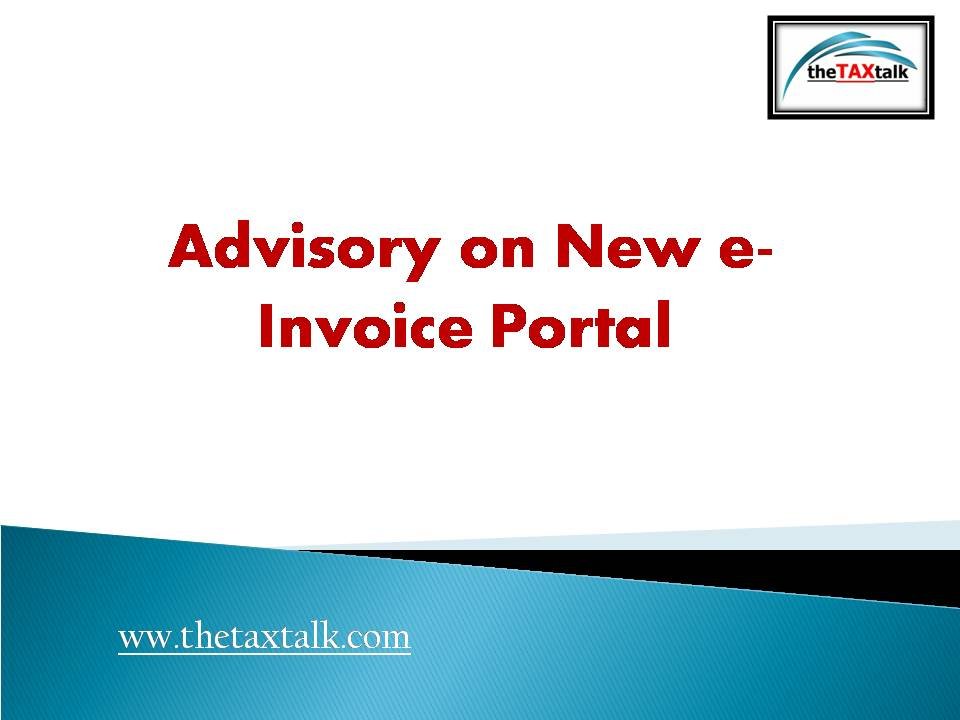![]()
Advisory on New e-Invoice Portal
Dear Valued Taxpayers,
1. We would like to inform you that GSTN has onboarded four new IRPs (Invoice Reporting Portals) for reporting e-invoices in addition to NIC-IRP. As a result, the beta launch of a new e-Invoice portal (www.einvoice.gst.gov.in), has been done where taxpayers can find comprehensive information on e-invoice compliance in a user-friendly format, such as check your enablement status, self-enable themselves for invoicing, search for IRNs, web links to all IRP portals – all the relevant links/information in one convenient location. Taxpayers can log in to the new e-invoice portal using their GSTN credentials for select services pertaining to their GSTIN profiles.
2. Taxpayers may note that the portal <einvoice.gst.gov.in> is reference site for all masters (data), news and updates, latest releases etc. For registering e-invoices and to access APIs, you still need to go to <einvoiceX.gst.gov.in> sites. The urls of IRPs sites authorised to generate IRNs as on date are as follows:
URL
URL Activation Status
<einvoice1.gst.gov.in>
Active
<einvoice3.gst.gov.in>
Shall be available soon
<einvoice4.gst.gov.in>
<einvoice6.gst.gov.in>
Also, at the helpdesk for e-invoice issues, for supporting the taxpayers vis-a-vis IRP issues is available at our Grievance Redressal Portal <selfservice.gstsystem.in> where the relevant IRP can be selected using the dropdown created for each of the private IRP.
3. Please note that taxpayers can continue to report e-invoices on the NIC IRP portal <einvoice1.gst.gov.in> as previously.
4. GSTN is committed to making your compliance journey as smooth as possible. If you have any questions or concerns, please do not hesitate to contact us.
Thank you for your cooperation.
Thanking You,
Team GSTN
[09:05, 25/02/2023] CA Naresh Jakh: Whether provision for warranty can be allowed as an expense under Income Tax Act?
A warranty is written guarantee, issued to the purchaser of an article by its manufacturer, promising to repair or replace it if necessary within a specified period of time. It is thus a future expense of a manufacturer which he may or may not incur.
Hon. Supreme court in the case of M/S. Rotork Controla India (P) Ltd vs Commnr. Of Income Tax, Chennai (CA No. 3506-10 of 2009) on 12 May, 2009 made the following observations on this issue:
1. There are 3 options in the case of accounting for warranty:
a) account for warranty expense in the year in which it is incurred ; (b) it makes a provision for warranty only when the customer makes a claim ; and (c) it provides for warranty at certain percentage of turnover of the company based on past experience (historical trend).
2. Among these three options, the first option is unsustainable since it would tantamount to accounting for warranty expenses on cash basis. The second option is also inappropriate since it does not reflect the expected warranty costs in respect of revenue already recognized. The third option is the most appropriate because it fulfils accrual concept as well as the matching concept.
Conclusion: The provision of warranty should be decided using a scientifically devised method based on past experience depending on factors like turnover of the company of previous years and provision for expenses on repairs during the warranty period.


